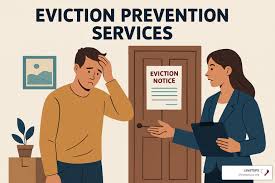Understanding Eviction: What You Need to Know to Protect Yourself
Facing the prospect of eviction can be an incredibly stressful experience for anyone. However, it is important not to panic. Most eviction cases in the United States require proper notice and a court order before a landlord can lawfully remove a tenant from the property. Understanding your rights and obligations, reviewing your lease and payment history, and taking timely actions can be crucial in protecting yourself from wrongful eviction.
This article provides a detailed overview of the eviction process, tenant rights, legal requirements, common pitfalls, and practical steps to take when facing eviction. Our goal at Legal Marketplace CONSULTANT is to ensure that you are well-informed and equipped to handle any challenges efficiently and legally in 2025 and beyond.
What is Eviction?
Eviction is a legal process through which a landlord seeks to remove a tenant from rental property. This process is typically initiated when a tenant fails to comply with the terms of the lease agreement, such as nonpayment of rent, violation of property rules, or expiration of the lease without renewal. It is important to understand that eviction is not an immediate or informal action but requires following specific legal procedures.
Landlords must adhere to state and local laws that protect tenant rights, including providing proper notice and obtaining a court order before physically removing a tenant. Failure to follow these procedures can result in legal consequences for landlords, including dismissal of eviction cases and potential damages awarded to tenants.
The Importance of Proper Notice
One of the fundamental legal protections for tenants is the requirement for landlords to provide proper notice before filing for eviction. Proper notice informs the tenant of the landlord's intent to terminate the tenancy and gives the tenant an opportunity to remedy the situation or prepare for moving out. The type and duration of notice vary by jurisdiction and the reason for eviction.
Common types of eviction notices include:
- Pay Rent or Quit Notice: Gives the tenant a specific period (usually 3-5 days) to pay overdue rent or vacate the unit.
- Cure or Quit Notice: Allows the tenant a chance to correct a lease violation.
- Unconditional Quit Notice: Requires the tenant to vacate the property immediately without an opportunity to fix the issue.
- Notice of Termination without Cause: Usually given at the end of a lease term when no reason is needed for termination.
Understanding the correct notice procedure is essential since missing or improperly serving notice may invalidate an eviction case.
Reviewing Your Lease Agreement
Your lease agreement is a legally binding contract between you and your landlord and governs the terms of your tenancy. When facing eviction, thoroughly reviewing your lease is a critical first step. Pay close attention to the following sections:
- Lease Duration and Renewal Terms: Know your lease start and end dates and any clauses related to automatic renewal or termination.
- Rent Payment Terms: Understand when rent is due, acceptable payment methods, and consequences of late payments.
- Rules and Regulations: Review provisions related to property use, noise, pet policies, and other tenant obligations.
- Eviction Clauses: Look for specific conditions under which eviction may occur, including notice requirements and remedies available.
Having a clear understanding of your lease terms can help you identify whether the landlord is legally justified in pursuing an eviction.
Maintaining Payment History and Documentation
Keeping accurate records of your rent payments and communications with your landlord is vital. Missing deadlines or neglecting documentation often contributes to eviction cases being lost from the tenant's perspective rather than the law itself being at fault. You should:
- Retain receipts, canceled checks, or bank statements confirming timely rent payments.
- Document all correspondence with your landlord, including emails, letters, and messages.
- Note dates and details of conversations or events related to tenancy issues.
Such documentation can be invaluable in court if you need to contest an eviction or prove compliance with lease terms.
Common Reasons for Eviction
While every eviction case is unique, some common reasons landlords file for eviction include:
- Nonpayment of rent
- Violation of lease terms such as unauthorized pets or subletting
- Property damage beyond normal wear and tear
- Engaging in illegal activities on the premises
- Expiration of lease term without renewal or invalid holdover
Understanding the Court Process for Eviction
If a landlord proceeds with an eviction, the case typically advances to the local housing or civil court. The process generally involves the following steps:
- Filing of Complaint: The landlord files a formal eviction complaint with the court.
- Summons and Notice to Tenant: The tenant is officially notified of the legal action and court hearing date.
- Court Hearing: Both parties present evidence and arguments.
- Judgment: The court issues a ruling either in favor of the landlord or the tenant.
- Writ of Possession: If the landlord wins, the court issues an order allowing eviction by law enforcement.
During this time, tenants should continue to pay rent and maintain communication if possible. Missing court dates or failing to respond can lead to default judgments against the tenant.
Tips to Protect Yourself If Facing Eviction
If you find yourself facing eviction proceedings, consider the following protective measures:
- Act promptly: Address notices and legal documents immediately.
- Communicate with your landlord: Sometimes issues can be resolved informally via payment plans or correction of lease violations.
- Keep thorough documentation: Maintain records of payments, notices, and correspondence.
- Attend court hearings: Your presence and testimony matter greatly.
- Seek professional legal help: Consulting a qualified attorney or legal aid organization can improve your chances.
When to Seek Legal Assistance
Eviction law can be complex and varies between jurisdictions. If you are uncertain about your rights or need proper help, it is advisable to consult professionals. Legal aid organizations, tenant unions, and private attorneys specializing in landlord-tenant law can provide guidance.
At Legal Marketplace CONSULTANT, we are committed to assisting tenants and landlords alike to navigate eviction challenges legally and effectively. Contact us through the communication methods provided in our bio or send a private message for consultation and support tailored to your case.
The Role of Fair Housing Laws
It is also important to remember that tenants are protected under fair housing laws which prohibit eviction on discriminatory grounds such as race, color, national origin, religion, sex, familial status, or disability. If you believe your eviction is discriminatory, you should seek immediate legal assistance.
Key Deadlines in the Eviction Process
Missing deadlines often results in lost cases, not the law itself being the issue. Tenants must pay close attention to deadlines including:
- Notice period to cure a lease violation or pay overdue rent
- Deadline to respond to lawsuits
- Court hearing dates
- Deadlines to vacate the property after a court ruling
Failing to act within these timeframes can result in losing important rights and options.
Understanding Your Options After an Eviction Judgment
If the court rules in favor of the landlord, tenants may have limited options but should know their rights. Options may include:
- Appealing the court’s decision within the allowed time frame
- Negotiating a move-out plan to minimize disruptions
- Requesting additional time to secure alternative housing
Ignoring eviction orders can lead to forcible eviction by law enforcement and potential damage to rental history.
Eviction, while intimidating, follows strict legal procedures that protect tenants’ rights. Most eviction cases require proper notice and a court order, and missing deadlines is usually what jeopardizes tenants’ defenses, not the law itself. By thoroughly reviewing your lease, maintaining comprehensive payment and communication records, responding promptly to notices and court actions, and seeking professional assistance when needed, you can better protect yourself from wrongful eviction and navigate the eviction process successfully.
If you need proper help or guidance, do not hesitate to contact Legal Marketplace CONSULTANT through the communication channels provided in our bio or send a private message for confidential support tailored to your specific situation.
Legal Marketplace CONSULTANT is a legal service company specializing in comprehensive legal assistance for tenants and landlords. Our team includes experienced attorneys, paralegals, and legal consultants dedicated to protecting your rights and resolving disputes efficiently. We provide consultations, legal representation, and tailored solutions to meet your needs.































